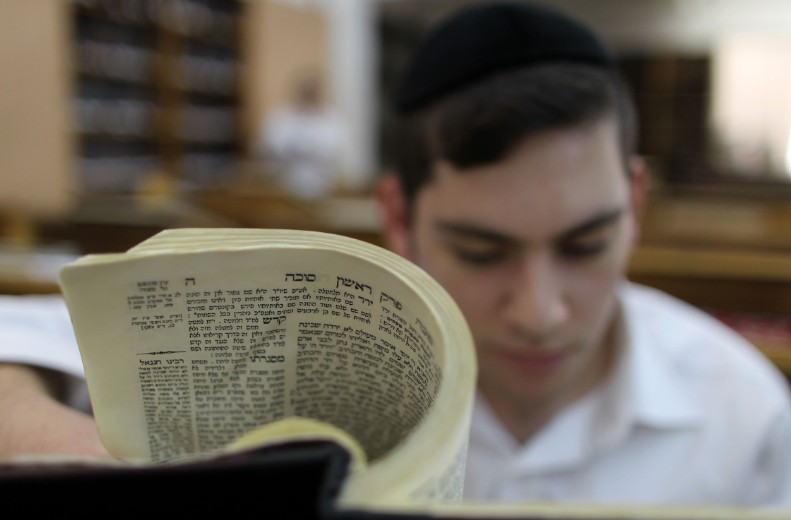Faith
Was the Mishnah and Gemara Given at Sinai? Understanding the Oral Torah’s Origins
The journey of the Oral Torah from its revelation to Moses at Sinai, through centuries of rabbinic interpretation, to the Mishnah and Gemara that guide Jewish life today
 Gemara
GemaraYaakov asks: "Shalom and blessings, I’ve long wondered whether the entire Torah – meaning the Mishnah and the Gemara – was given to Moshe at Sinai, or whether they were added later? Were the disputes also given then, and what exactly are the Mishnah and Gemara?"
* * *
Shalom Yaakov,
Thank you for your important questions. Let’s clarify the matter and explore the Jewish bookshelf.
Our Sages taught: “Everything that a seasoned student is destined to innovate was already said to Moshe at Sinai” (Vayikra Rabbah 22). This means that Moses saw in prophecy, all the generations from the beginning to the end, and was shown the Torah insights they would later derive. However, these future insights were not actually given to the Israelites in the desert at that time.
Moses transmitted:
The Written Torah – the Five Books of the Torah.
The Oral Torah – verbal explanations and details for all 613 commandments found in the Written Torah.
The 13 Principles of Torah Interpretation – methods by which qualified Torah scholars (the Tannaim and Amoraim) could interpret verses according to tradition to clarify laws and their sources.
These methods allowed the Sages to derive rulings in matters where the Torah itself had left more than one valid path for applying the law. As God foresees all generations, His Torah was designed with the capacity to reveal new halachic applications in each era through these methods.
Regarding the famous disputes, such as those between Beit Hillel and Beit Shammai, our Sages said: “These and those are the words of the living God” (Eruvin 13b) – meaning both views are Torah-true, but the final ruling is decided by majority vote. Importantly, all disputes in the Gemara concern details – like branches and leaves of a tree – while all share the same strong and unified trunk.
The Torah commands us to trust the Sages of our generation and follow their rulings: "According to the Torah they teach you… do not turn aside from what they tell you, right or left" (Devarim 17:11).
![(Photo: Nati Shohat / Flash 90)]() (Photo: Nati Shohat / Flash 90)
(Photo: Nati Shohat / Flash 90)
 (Photo: Nati Shohat / Flash 90)
(Photo: Nati Shohat / Flash 90)The Purpose of the Mishnah and Gemara
The Sages’ interpretations were never intended to create “new commandments,” G-d forbid. They served to clarify the Torah’s commandments in detail. These explanations, given to Moses at Sinai, were transmitted faithfully through the Oral Torah until eventually recorded.
After the destruction of the Second Temple, there was a flourishing era of scholarship among the Sages. These scholars were called Tannaim, and their students were called Amoraim. The Tannaim’s discussions and rulings on the Oral Torah – which had been passed down since Sinai – were compiled by Rabbi Yehuda HaNasi nearly 2,000 years ago into what we now call the Mishnah, arranged into the Six Orders (Shisha Sidrei Mishnah).
The Gemara was written about 500 years later. It records the extensive debates of the Tannaim and Amoraim on the laws and disagreements in the Mishnah. The Gemara explains the Mishnah, discusses the sources of the laws, clarifies the reasoning, resolves disputes, and includes moral and philosophical teachings, Biblical interpretations, stories, and historical accounts.
The Babylonian Talmud (commonly referred to simply as “the Gemara”) was finalized by Ravina and Rav Ashi about 1,500 years ago. Later, works like the Mishneh Torah of Rambam and the Shulchan Aruch established halacha based on the Gemara.
Why the Gemara is Studied to This Day
The study of Gemara has continued in every generation and is the primary learning in yeshivot. It’s not only a guide to understanding the law and its foundations, but also a training ground in Torah thinking – teaching students how to analyze, ask sharp questions, propose answers, and test ideas.
A student who finds that the very question he asked is the same one posed by the great Sages in the Gemara experiences a deep joy and connection – bringing his own mind closer to theirs. Gemara study does not only inform; it shapes the intellect and sanctifies the person from within.
If you have the chance, I warmly recommend joining a Daf Yomi Gemara class to experience firsthand the priceless heritage our Sages have entrusted to us.

